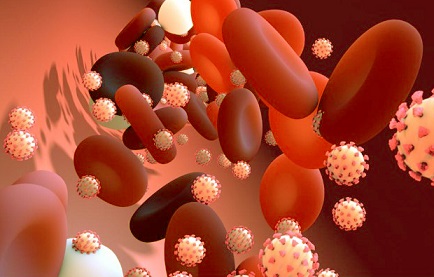SARS-CoV-2’s Mpro protein promotes blood clotting by activating key coagulation factors
Nikhil Prasad Fact checked by:Thailand Medical News Team Nov 13, 2024 11 months, 4 days, 22 hours, 24 minutes ago
Medical News: Researchers from multiple institutions, including the University of Padua, ETH Zurich, Johannes Gutenberg University Mainz, and the University Hospital of Padova, have uncovered a novel mechanism by which the main protease (Mpro) of SARS-CoV-2 actively induces blood clotting. This discovery sheds light on why COVID-19 patients often face severe blood clotting issues, contributing to the virus’s high mortality rate among critically ill patients.
 SARS-CoV-2’s Mpro protein promotes blood clotting by activating key coagulation factors
Key Findings: How SARS-CoV-2 Mpro Triggers Blood Clotting
SARS-CoV-2’s Mpro protein promotes blood clotting by activating key coagulation factors
Key Findings: How SARS-CoV-2 Mpro Triggers Blood Clotting
From the early days of the pandemic, doctors noticed that COVID-19 patients had a high likelihood of developing blood clots. Although inflammatory responses were thought to drive this, scientists hadn’t pinpointed a direct viral cause - until now. This
Medical News report highlights a groundbreaking study in which scientists found that SARS-CoV-2's Mpro protein actively stimulates blood coagulation by specifically targeting and activating two key clotting factors, VII and XII, within human blood plasma.
Adding Mpro to human plasma samples increased the likelihood of clot formation by 2.5 times, a significant jump that points to the protease’s potent influence on clotting. Through a combination of biochemical assays and advanced mass spectrometry, the researchers determined that Mpro can trigger blood coagulation by selectively activating factors VII and XII. These factors lie at the start of two major clotting pathways, the extrinsic and intrinsic pathways, highlighting the far-reaching impact of Mpro on blood clotting.
SARS-CoV-2’s Mpro Breaks Established Protease Rules
Interestingly, Mpro doesn’t behave like most viral proteases. Viral proteases generally don’t directly interact with human blood clotting factors to cause coagulation. Instead, Mpro’s unique structure allows it to activate factors VII and XII by cleaving specific sites within these proteins. This activity hints at an unexpected flexibility in Mpro’s target selection, as the protease typically favors sites that are rarely found in human blood clotting proteins.
To confirm Mpro’s unusual activity, the researchers conducted a high-throughput protease screen, or HTPS, to explore the protease's specificity. This screen revealed that Mpro could expand its preference to cleave bonds not previously associated with its function, specifically targeting Arg-X bonds, which are commonly found in clotting factors VII and XII. This secondary specificity was confirmed in follow-up tests, showing that Mpro can interact with and cleave these clotting factors in a way that promotes rapid clot formation in the bloodstream.
Experimental Validation and Findings
To verify their findings, researchers used both in-house and commercially sourced Mpro samples, and the clotting response remained consistent across plasma samples from various heal
thy donors. The probability of clotting increased steadily with exposure to Mpro, confirming its influence across different individual plasma samples.
Advanced analyses using biochemical assays demonstrated that Mpro effectively converts factor VII into its active form, factor VIIa, in a manner similar to other known clotting activators. Additionally, they observed Mpro’s action on factor XII, which is usually activated by negatively charged surfaces in the bloodstream. Remarkably, Mpro could activate factor XII without the need for these surfaces, further supporting the idea that Mpro’s direct action in the bloodstream plays a critical role in COVID-19-related blood clotting.
The researchers also tested whether Mpro might impact other major clotting factors, like prothrombin and fibrinogen, but found no significant effects, underscoring Mpro’s selective targeting of factors VII and XII. Moreover, they observed that Mpro does not affect antithrombin III, an anticoagulant factor, confirming that its effect is highly specific to promoting clotting rather than interfering with anticoagulation.
Broader Implications: Could Mpro Be a Therapeutic Target?
The implications of these findings go beyond just explaining a mechanism; they may also open doors for targeted treatments. The study’s authors suggest that if Mpro is confirmed to circulate in the bloodstreams of COVID-19 patients, then targeting this protease could prevent or mitigate the virus's clotting effects. Given the high incidence of blood clotting issues in severe COVID-19 cases, therapies designed to inhibit Mpro might reduce these risks and lower the overall mortality associated with COVID-19-induced thrombotic complications.
Conclusion
This study provides crucial insight into how the SARS-CoV-2 virus can directly promote blood clotting, enhancing our understanding of COVID-19’s severe effects on the cardiovascular system. By revealing that Mpro selectively activates key clotting factors VII and XII, scientists have uncovered a new layer of COVID-19 pathology that could inform future treatment approaches. These findings highlight the potential of Mpro as a therapeutic target, paving the way for innovative treatments that address the clotting complications seen in COVID-19.
The study findings were published on a preprint server and are currently being peer reviewed for publication into the Nature journal.
https://www.researchsquare.com/article/rs-4959212/v1
For the latest COVID-19 News, keep on logging to Thailand
Medical News.
Read Also:
https://www.thailandmedical.news/news/mll1-enzyme-identified-as-key-driver-of-blood-clotting-risks-in-severe-covid-19-cases
https://www.thailandmedical.news/news/is-platelet-activating-factor-the-key-link-between-covid-19-and-atherosclerosis-risk
https://www.thailandmedical.news/news/covid-19-can-cause-an-autoimmune-related-blood-complication-known-as-antiphospholipid-syndrome
